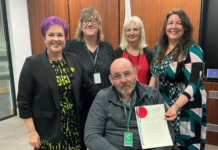An expert in estate planning has shared his advice to help people avoid legal wrangles over their inheritance.
Steve Bish, from S Bish Estate Planning, has warned that Wills which contain errors could mean your final wishes are not carried out.
His advice comes after a High Court ruled that a Will left on the back of two food boxes is valid.
The case focused on Malcolm Chenery, who died in 2021, and who left his estate including a three-bedroom house to the charity Diabetes UK. But it took extensive legal wrangling before the charity could inherit the £180,000.
The charity triumphed in a court bid to claim the fortune of the cricket fan whose unusual and homemade last Will was scrawled on the back of boxes for Mr Kipling mince pies and frozen fish.
A court heard how Mr Chenery, a self-professed ‘loner’ who said he enjoyed the best times of his life at York Cricket Club’s ground with his mother, ended his own life in 2021. He left behind his three-bedroom house as well as money, plus jewellery that came from his mother and an extensive collection of ornaments and pottery.
Mr Bish said: “This is a remarkable case, but it underlines just how a crucial a Will is to ensuring your wishes are carried out after you have died. But it is easy to make an error when you draw up or sign a Will which could make it invalid.”
Explaining what makes a Will invalid, Mr Bish said: “There are several ways in which a Will could be invalid, including one that is not correctly signed and witnessed,” explains Steve.
“Two witnesses need to sign as well as the person making the Will. The witnesses should ideally be over 18 and of sound mind, and not blind. They should not be relatives or beneficiaries or married or related to beneficiaries.
“The witnesses should both sign the Will in sight of each other and of the person making the Will.”
Another reason your will might be deemed invalid is if you lack capacity. This is a medicolegal term which encompasses whether the person has the ability to understand and retain information.
“The person making the Will must understand the implications of making the Will,” says Steve.
“Where an individual does not have sufficient mental understanding, their Will is invalid. With the increasing prevalence of dementia, this is something people should consider so that they don’t leave it too late before writing down their wishes.
“If there is likely to be any question over this in the future, it is recommended that a medical professional provide a letter confirming that they have talked to the person making the Will and found them to have sufficient capacity to do so.”
Although the case involving Mr Chenery was unusual, it is by no means unique. Here Steve shares some examples of some of the unusual cases involving wills and inheritance:
There is one case of a man who carved his Will onto a tractor after he was trapped under it for ten hours, fearing he would not be found alive.
An even more unusual case happened in London in 1926 when the wife of John Barnes found written on the inside of an ostrich egg shell on top of the wardrobe in his bedroom, ’17-1925. Mag. Everything I posses. J.B.’ In this case the judge ruled that it was insufficient to prove it should replace an existing, formal Will because Mr Barnes was not on active service to count as what are known as a ‘Privileged’ or ‘Battlefield’ Will.
Then there was Harry Houdini, whose final wishes had a little bit of magic to them. He requested his wife Bess conduct a seance each year on the anniversary of his death so he could communicate from the other side. (The code he left for Bess to read was: “Rosabelle, answer, tell, pray, answer, look, tell, answer, answer, tell.”) Unfortunately, her attempts failed and she gave up after 10 years of trying. But others took up the tradition, which still goes on today.
William Shakespeare famously spurned his wife by leaving her his “second best” bed in his Will, but German author Heinrich Heine was more brutal. Upon his death in 1856, he bequeathed his entire estate to his wife Matilda — provided she remarried. Why that condition? As Heine saw it, then “there will be at least one man to regret my death.”
And finally…..On top of having a very long name, Luis Carlos de Noronha Cabral da Camara was a wealthy Portuguese aristocrat. But he didn’t have any children or many friends, so when he drafted his Will he randomly picked 70 names from a Lisbon phone book. Those lucky strangers received portions of his fortune, estimated to be several thousand Euros each.
Help keep news FREE for our readers
Supporting your local community newspaper/online news outlet is crucial now more than ever. If you believe in independent journalism, then consider making a valuable contribution by making a one-time or monthly donation. We operate in rural areas where providing unbiased news can be challenging. Read More About Supporting The West Wales Chronicle
























